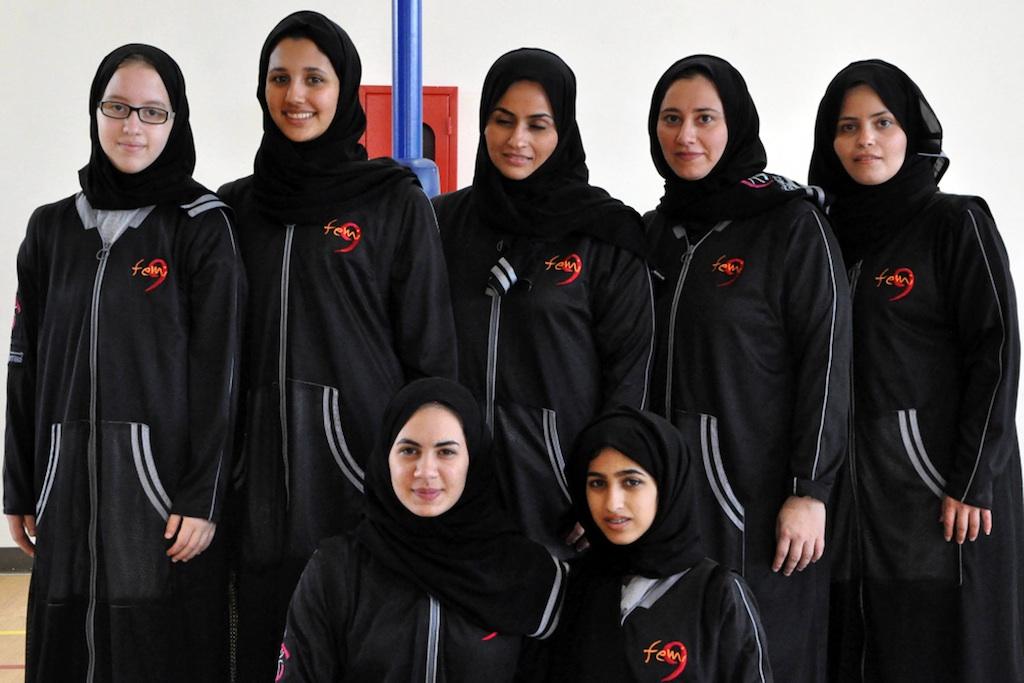Saudi women banned from national Olympic delegation
Members of the first female Saudi basketball team ‘Jeddah United’ pose for a team picture in the Red Sea port city of Jeddah on March 25, 2102. Saudi Arabia, where sports events for women are banned, will not send female athletes to the Olympics this year.
There will be no Saudi women competing in London at the Olympics this year as Saudi Arabia continues its official ban on women's participation in international sport.
No woman has ever been sent with a Saudi delegation to the Olympics, and the only possible female Saudi competitor this year would be equestrian Dalma Rushdi Malhas — but she won't be tagging along with the official national team. She must go it independently, as she did at the Singapore Youth Olympics in 2010.
Calls to ban Saudi Arabia from the Olympics this year are getting louder after National Olympic Committee president Prince Nawaf bin Faisal said, "we are not embracing any female Saudi participation in the Olympics or other international championships."
More from GlobalPost: Saudi Arabia: The Road Beyond 9/11
The International Olympic Committee (IOC), the governing body responsible for organizing the games and sticking to the rules of the Olympic Charter, said in a statement, "We are still in discussion and working to ensure the participation of Saudi women at the Games in London," according to the Guardian. But it appears Saudi Arabia won't budge from its position on the matter, despite reports in March that it might allow women to compete.
A Human Rights Watch report titled, "Steps of the Devil: Denial of Women's and Girls' Right to Sport in Saudi Arabia," details the extreme steps the Saudi Arbian government takes to prevent women and girls from sports and athletic competition, including closing gyms, removing girls physical education from public schools and a ban on participating on national teams under the supervision of Prince Nawaf.
These are grounds for exclusion from the Olympic Games, says Sue Tibballs, chief executive of the Women's Sport and Fitness Foundation (WSFF). "Saudi Arabia's current refusal to send sportswomen to the Olympics puts them directly at odds with one of the IOC's fundamental principles as laid out within the Olympic Charter."
Discrimination is number six on a list of seven Fundamental Principles of Olympism, part of the Charter [PDF] that governs the international games, and discrimination against gender is specified as, "Any form of discrimination with regard to a country or a person on grounds of race, religion, politics, gender or otherwise is incompatible with belonging to the Olympic Movement."
More from GlobalPost: Women's rights key to Kingdom's future
The IOC Charter also very clearly outlines as part of the mission of the organization that it has a responsibility "to act against any form of discrimination affecting the Olympic Movement" and "to encourage and support the promotion of women in sport at all levels and in all structures with a view to implementing the principle of equality of men and women."
In 2000 Afghanistan was banned from inclusion in the Olympics because of discrimination against women under Taliban rule, and South Africa was banned from 1964 to 1992 because of the apartheid government.
It remains to be seen whether the IOC will take the Saudi discrimination situation seriously enough to ban the country from the 2012 London Games.
“If the International Olympic Committee was looking for an official affirmation of Saudi discrimination against women in sports, the minister in charge just gave it,” said Christoph Wilcke, senior Middle East researcher at Human Rights Watch.
The story you just read is accessible and free to all because thousands of listeners and readers contribute to our nonprofit newsroom. We go deep to bring you the human-centered international reporting that you know you can trust. To do this work and to do it well, we rely on the support of our listeners. If you appreciated our coverage this year, if there was a story that made you pause or a song that moved you, would you consider making a gift to sustain our work through 2024 and beyond?
